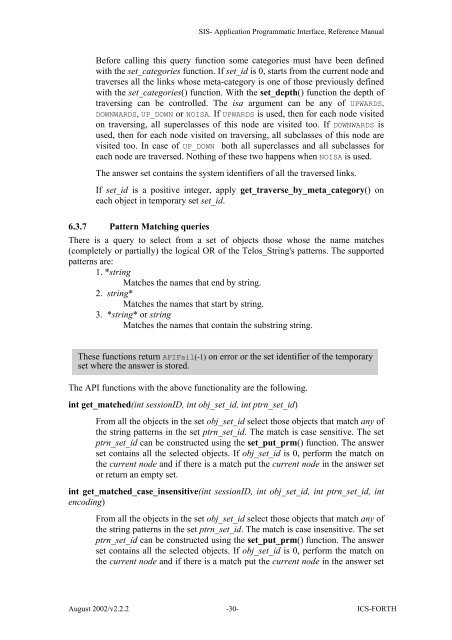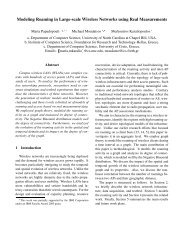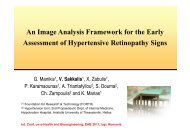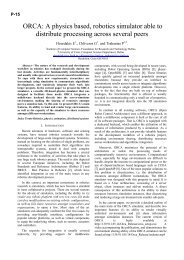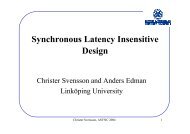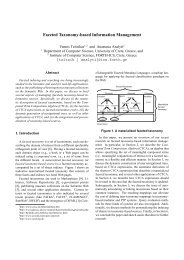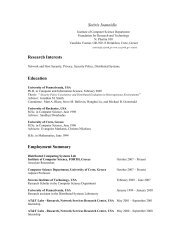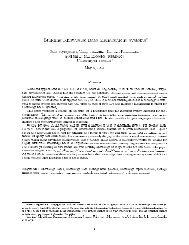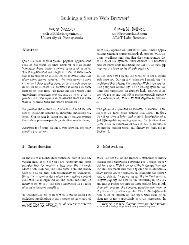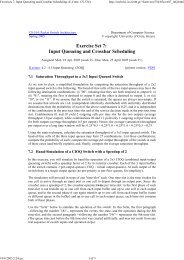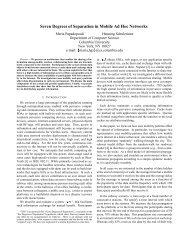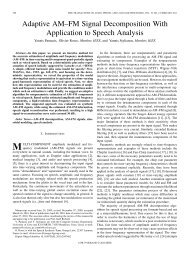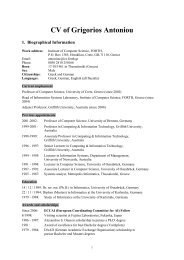SIS - Application Programmatic Interface, Reference Manual - ICS ...
SIS - Application Programmatic Interface, Reference Manual - ICS ...
SIS - Application Programmatic Interface, Reference Manual - ICS ...
Create successful ePaper yourself
Turn your PDF publications into a flip-book with our unique Google optimized e-Paper software.
<strong>SIS</strong>- <strong>Application</strong> <strong>Programmatic</strong> <strong>Interface</strong>, <strong>Reference</strong> <strong>Manual</strong><br />
Before calling this query function some categories must have been defined<br />
with the set_categories function. If set_id is 0, starts from the current node and<br />
traverses all the links whose meta-category is one of those previously defined<br />
with the set_categories() function. With the set_depth() function the depth of<br />
traversing can be controlled. The isa argument can be any of UPWARDS,<br />
DOWNWARDS, UP_DOWN or NOISA. If UPWARDS is used, then for each node visited<br />
on traversing, all superclasses of this node are visited too. If DOWNWARDS is<br />
used, then for each node visited on traversing, all subclasses of this node are<br />
visited too. In case of UP_DOWN both all superclasses and all subclasses for<br />
each node are traversed. Nothing of these two happens when NOISA is used.<br />
The answer set contains the system identifiers of all the traversed links.<br />
If set_id is a positive integer, apply get_traverse_by_meta_category() on<br />
each object in temporary set set_id.<br />
6.3.7 Pattern Matching queries<br />
There is a query to select from a set of objects those whose the name matches<br />
(completely or partially) the logical OR of the Telos_String's patterns. The supported<br />
patterns are:<br />
1. *string<br />
Matches the names that end by string.<br />
2. string*<br />
Matches the names that start by string.<br />
3. *string* or string<br />
Matches the names that contain the substring string.<br />
These functions return APIFail(-1) on error or the set identifier of the temporary<br />
set where the answer is stored.<br />
The API functions with the above functionality are the following.<br />
int get_matched(int sessionID, int obj_set_id, int ptrn_set_id)<br />
From all the objects in the set obj_set_id select those objects that match any of<br />
the string patterns in the set ptrn_set_id. The match is case sensitive. The set<br />
ptrn_set_id can be constructed using the set_put_prm() function. The answer<br />
set contains all the selected objects. If obj_set_id is 0, perform the match on<br />
the current node and if there is a match put the current node in the answer set<br />
or return an empty set.<br />
int get_matched_case_insensitive(int sessionID, int obj_set_id, int ptrn_set_id, int<br />
encoding)<br />
From all the objects in the set obj_set_id select those objects that match any of<br />
the string patterns in the set ptrn_set_id. The match is case insensitive. The set<br />
ptrn_set_id can be constructed using the set_put_prm() function. The answer<br />
set contains all the selected objects. If obj_set_id is 0, perform the match on<br />
the current node and if there is a match put the current node in the answer set<br />
August 2002/v2.2.2 -30- <strong>ICS</strong>-FORTH


